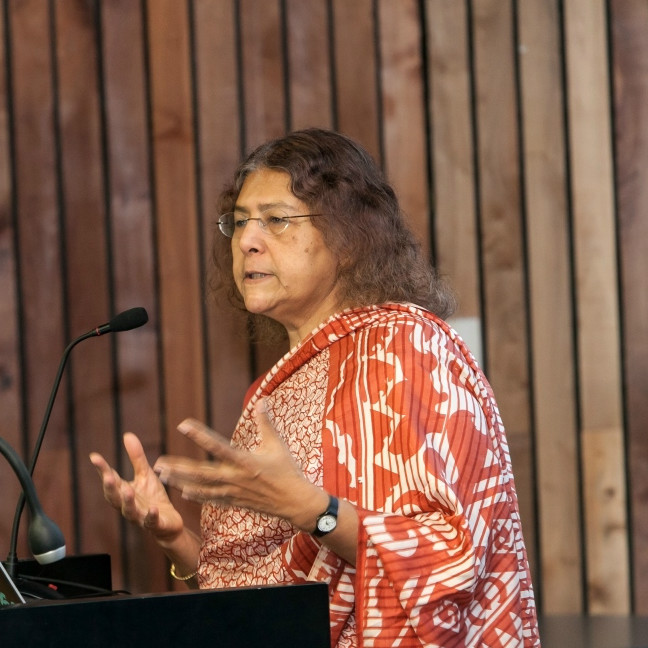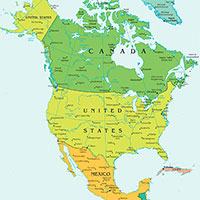How could scientists communicate more effectively in order to avoid contesting interpretations of their findings?
One place to begin: what often looks like contestation over facts, over a claim that is made about nature, if you look more closely, it turns out to be a contestation over some underlying values. People keep on piling more facts on top of each other but it turns out that what people really disagree on is something else. Right now there are decades and decades of research on so called technological controversies, and these are always both scientific and value-based or politically-based. The divisive issue can be about things like who has the responsibility for taking care of a problem or about the time scale on which you should be addressing a problem.
Until those questions get decided, people will continue to disagree on what the facts are, or could be. It is almost an intellectual mistake to believe that just because a controversy presents itself as a debate about facts, facts are the only things involved. Almost inevitably, something else is involved as well, something that has to do with people’s values and preferences.

Professor Sheila Jasanoff, Harvard Kennedy School
As far as I can tell from surveys, the world population sees that climate change is real and the question is more about whose responsibility it is to take the next steps. One view is that it is the responsibility of richer countries, under the theory that emissions should be looked at on a per capita basis, and individuals in rich countries are emitting more. Another theory says, no, heavily populated, poorer countries are emitting just as much as richer countries with smaller populations, so everybody is equally responsible. From the early 1990s, people were talking about distinguishing luxury emissions from survival emissions. That’s a rhetorically effective way of talking but it is also one of many examples of the initial framing problem. If people disagree on the scale at which comparisons should be made (individual or national emissions), they will never agree on the solutions.
What is your view on the connection or disconnection between the climate change impacts we see and governments’ actions or political will to build climate resilience?
It has been widely shown in discussions about risk that people respond to narrative better than they do to probabilistic statements. The probability of an extreme weather event will not grab people’s attention in the same way as if you say that Boston will be under this many meters of water or that familiar landmark will be washed away. The way people attach meanings to events differs, depending if you are a scientist reading graphs and charts or an ordinary person understanding climate in terms that are more related to memory or history. Part of the question is how one can make climate impacts more palpable to governments and to people so that they do respond to them. Very recently, we saw how one image of a drowned child created more response around the world than telling people that hundreds and thousands of refugees are on the move.
The idea of extreme weather is not uniform and the consequences might be felt differently by citizens from different locations. There are many examples at the municipal level of people becoming engaged in climate change concerns, because the municipal or city scale is one where people relate to their environment very directly. And this is something that is in fact taking place in quite a few cities around the globe – not just in rich countries.
In a few cities with histories of rivers flooding, citizens are included in scenario building by the municipalities. Such things are already happening. Translating that into a global political will is the challenge.
How scientists originally named the phenomenon of global warming and later changed the name to climate change caused confusion to people. If you have the idea of global warming in your mind, you can always point to a city or country that’s having a very bad winter, like my own city of Boston last year, and say, “Where is the warming?” And of course, there are politicians who like the status quo and are prepared to take advantage of something like that.
Do you think conferences such as COP should take place at continent levels or at least at “similar culture” levels in order to get more consolidated and culturally accepted solutions that can be adopted locally?
I think that the right model here is apparent from years of experience with international law, that is, it is good to craft an agreement on high level principles and then work out details of implementation at lower levels. But then, exactly what does it mean to implement agreements with different local preferences being taken into account? One example is the idea of subsidiarity in the European Union. When Brussels works well, the European Union functions because it abides by this principle. In America, we have a federal system as well. The principle that we adopted to govern air pollution, for example, was that there would be national standards (under the Clean Air Act), but each state would come forward with its own implementation plan about how-to meet the standards. The States can gather their industries together and decide how best to bring down the total emissions to the right levels.
I myself believe that statements of principle have a lot of value even if they are not immediately translatable into local policies. As in a constitution system of government, the words in the constitution mean something to people even when there are disagreements about how to translate them into specific legal requirements.
Different world governance organisations such as the WTO exist, why does climate change not have a global governance body, even though it is a global issue?
I would say that climate change does have global governance. It’s just global governance at a much more informal level. But it is premised on a view that I, as a student of Science and Technology, find problematic. What we seem to have said is that governments of the world will put together a global scientific body with representatives from all countries. That scientific body will be entrusted with figuring out what the state of the world is, in particular with regard to climate, and then the politicians will act afterwards. The IPCC itself claims that it is being policy relevant and not policy prescriptive. And that distinction is actually quite hard to maintain. Reaching consensus on the facts of climate change calls for a lot of judgment. Asking for the facts first and policy afterwards tends to hide the values that are latent in making scientific judgments, especially about something so complex as climate change.
Should nature be granted legal rights similar to those of any human being? Would it help citizens to stop putting an economic value on nature and instead develop empathy?
That’s a complicated question. On both theoretical and practical grounds, ‘rights’ are not always an effective way to defend something. How one’ defend those rights and how you enforce those rights may depend on your capacity to defend them. Rights are only as good as the right-holder’s capacity to articulate and enforce them. The powerless may not be able to assert their rights because they are too weak.

That said, there are some countries right now that recognize the environment should either have fundamental rights or rights to be protected in various ways. In a world that is dominated by capitalism, this idea has not proved to be very persuasive for policy makers. If you look at the last 30 years of environmental regulation in America, you find more and more people buying into the idea that you have to talk economics in order to protect things. Under that theory, it is important to show that nature has an economic value. Empathy is not enough.
But I think it is important that people should recognize there are some things that you should not value only in terms of the market. There are some things that we need to hold in reserve for humanity as a whole – not just now, but also in the future.
I do think that if you have deliberative forums – forums where people come together and talk about the value of things – there is a possibility to persuade people that the environment has intrinsic value. Trees, for example should not be counted only in terms of their energy content and how they sequester carbon. There are other reasons to value things in nature.
We’ve already made a jump to thinking that the only way to solve climate change is to put a dollar value on carbon, to turn the climate problem into a market problem. But I think that chain of logic can be cut. It’s not an unbreakable chain.
Do you think technology is the answer for climate change? And if so, how can we ensure that while scientists are creating a solution they are not simultaneously creating a new problem?
Obviously, technological developments are going to be part of the solution or part of the response to anything you do about climate change. We have a sun and we have wind and we have an entire living planet, and these are natural forces that can be turned to use. And there are many yet undiscovered pathways about how we can put these things to use in ways that are not damaging to the environment and still would help people in the short run.
It makes no sense in today’s modern world to say that there’s a technology-free solution to difficult problems. At the same time, we know from long experience that there is a phenomenon of unthinking technophilia, that people get caught up thinking that technological fixes are going to solve all the problems.
Let’s take the example of geoengineering. People think that we have a planetary scale problem, therefore we need a planetary scale solution. They think of solutions such as solar radiation management through geoengineering. That makes me nervous because mega-solutions typically have not tended to work as planned. There are many things one can get wrong in modeling large-scale projects, and also those mega-solutions are often very difficult to govern and quite anti-democratic.
What are your expectations and what would you like your work to bring in the climate change debate for the coming years?
There is a fairly significant danger about what’s going to happen if a league of the most powerful make these decisions for humanity as a whole. So far, we have given the world only one model for how the future should look, and that is the model of perpetual economic growth.
If you go to a city like New Delhi and see what’s happening in terms of air pollution, or traffic, it is very distressing. Infrastructure is in terrible shape in India – even in America – and how will you provide a country of one billion plus people with public transportation, which you need to reduce car emissions and pollution? And the middle class understandably wants its cars and its goods to consume. That is what grows the GDP and counts as development.

The fundamental question for justice is how prospects for people at the lowest levels of global society will improve while also taking care of climate change. I don’t think that’s going to be addressed adequately at COP21 and I think it remains a very serious problem.
We can’t think that having US and China agree at presidential levels will be enough. We are not paying sufficient attention to the need for bottom-up initiatives that parallel the top-down ones.
Climate change is anthropogenic, and according to some specialists requires the shift of the current structure of the society and individual mentality away from consumerism and even the capitalistic mindset. How do you think we could allow this paradigm shift to happen? In both individual and societal level?
I think that we all have some responsibility as citizens of the world to see how we can individually respond to that problem. For me personally, it is through public speaking, taking positions, writing for different audiences. I’m not myself going to be the person who goes in for leading a global movement, but I think the climate march last year in New York – which had up to 400,000 people attending – was a massive and important demonstration. It was a single event, but an attempt like that energises many people who bring back the energy to their communities and drive further action.
One thing that is interesting for me to note is that the attitude of the student population is evolving, and their activism is getting more intense. There is a huge shift as more students are coming of age with awareness of climate change as a central social problem.
I do think that we may be on a verge of an important change that none of us can precisely predict. I sense that there are winds of change moving in the right direction.
***
















comment